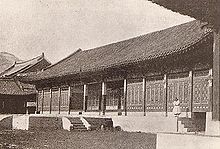Kyujanggak
| Kyujanggak | |

The Kyujanggak, sometime before 1910
|
|
| Korean name | |
|---|---|
| Hangul | 규장각 |
| Hanja | 奎章閣 |
| Revised Romanization | Gyujanggak |
| McCune–Reischauer | Kyujanggak |
The Kyujanggak, also known as Gyujanggak, was the royal library of the Joseon Dynasty. It was founded in 1776 by order of King Jeongjo of Joseon, at which time it was located on the grounds of Changdeokgung Palace. Today known as Kyujanggak Royal Library or Kyujanggak Archives are maintained by Kyujanggak Institute for Korean Studies at the Seoul National University, located in Sillim-dong, Gwanak-gu in Seoul. It functions as a key repository of Korean historical records and a centre for research and publication of an annual journal titled Kyujanggak.
It is named after imperial calligraphic works stored there, the kyujang (奎章), which literally means "writings of Kyu", a scholar-deity, but has come to refer to divinely inspired writings, in particularly, the emperor's.
In 1782, the Outer Kyujanggak library (known as Oegyujanggak) was built in the ancient royal palace on Ganghwa-do Island to accommodate an overflow of books from the main Kyujanggak library at Changdeokgung Palace in Seoul, where the royal viewing copies were kept, and most of the viewing copies were transferred there.
The library's role underwent various changes after the Gabo Reforms of 1894. In 1922, it was moved under the jurisdiction of Keijo Imperial University, which later gave rise to the Seoul National University. The library moved to its present location in 1990 and became independent of the Seoul National University Central Library in 1992.
In 1866, during the French campaign against Korea, the troops attacked Ganghwa-do Island and seized a vast amount of silverware, royal artifacts, and 297 volumes of royal Uigwe from the Outer Kyujanggak library and burned down the building. The Korean Government tried to retrieve the royal documents through a permanent lease, since French law prohibits national assets to be transferred abroad. In 2010, a Seoul-based civic group spearhead the return but the request to exclude illegally obtained property from its list of national assets was rejected by a Paris court. An agreement was made by President Lee Myung-bak and President Nicolas Sarkozy at the 2010 G-20 Seoul summit to return the royal documents on a five-year renewable loan basis. From April to June 2011, 297 volumes with 191 different Uigwes, were shipped back in four separate installments and subsequently kept at the National Museum of Korea.
...
Wikipedia
